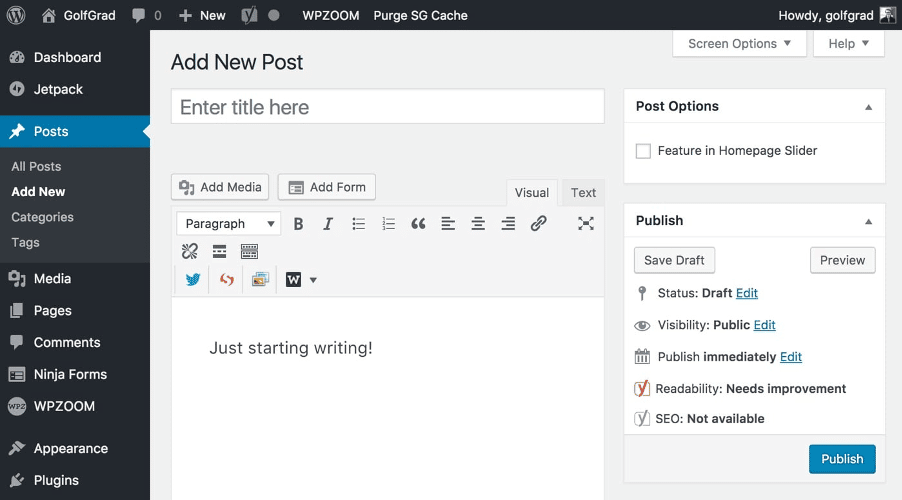Table of Contents
In content marketing, landing pages and blog posts appear surprisingly similar. Both are published directly on your website, rely on written content, and are frequently used for lead generation.
So, when it’s time to drive traffic and turn visitors into customers, how do you know which is best for the job?
To help you choose between landing pages and blog posts for your WordPress website, we’ve put the two side-by-side in this handy guide.
Landing Pages vs Blog Posts
What is a Landing Page?
When a user clicks on a link to your website in an email, social media ad, or a search result, they might end up on a landing page.

This is a page published on your website designed for a specific purpose. It’s worth noting that landing pages can be hidden from your website’s main navigation and only accessed via links in your wider marketing strategy.
When creating landing pages, the content should be highly relevant to the ad or search result your user clicked.
For example, you might use geo-targeting to create localized social media adverts for specific areas that you service. The corresponding landing page should also be localized, ensuring that when the user clicks on the link, they’re directed to relevant, helpful information aligned with your social media ad.
You can also use landing pages to target queries your audience is searching for, boosting search engine optimization (SEO) for effective lead generation.
These might be key terms you’re not answering on your website or niche topics that warrant a dedicated page to match user intent and improve search visibility.
Other use cases of Landing Pages
Other uses of landing pages include:
- Directing your audience to newsletter sign-ups
- Offering free downloads or product samples
- Marketing limited-time offers
- Promoting event registrations
- Showcasing new product launches
Landing pages vs Blog Posts: Landing pages have an average conversion rate of 9.7%, which is considered very good in the marketing industry and highlights their potential to drive high-quality traffic to your website.
When speaking with content marketing agency Hive19, Cofounder and Head of Content Maxine Bremner states, “High-converting landing pages on WordPress need more than a great copy. They need to align across design, messaging, and SEO. The most effective pages focus on one audience segment, goal, and action. Using benefit-focused language, persuasive headlines, social proof, and strategically placed, punchy CTAs can reduce friction, build trust with your target customer, and drive more qualified leads while improving your SEO performance over time.”
What is a Blog Post?
Blog posts are another aspect of content marketing that can be used for effective lead generation.

They’re typically published on your website’s blog, news, or resources section and can be easily found via your navigation bar or links in your footer.
Usually, blogs will share relevant information and experiences about your business. They’re designed to:
- Help your audience by answering questions
- Highlight the potential of your product or services
- Share business news or updates
- Show your knowledge in your industry
Like landing pages, lead generation blogs can target key terms identified through your keyword research for an SEO boost.
For example, if your audience is searching for SEO tips, write a blog titled ’10 SEO Tips for Beginners’ to try and rank for this search term. The higher you rank, the more leads you will likely head your way.
Blogs also frequently include call-to-actions (CTAs). While this isn’t as prominent a focus as it is for landing pages, ensuring your readers take the next step rather than bouncing off your website is still essential.
How Are Blogs and Landing Pages Different?
Your landing pages will often be used to market a product, service, event, or offer.
They’re oriented around what your business can offer the reader and encourage users to take action through clear CTAs.
While blogs can highlight your products or services, they’re also used to share ideas and information that aren’t solely focused on conversion.
For instance, if you own a dog food business, you might write a blog post on ‘how to spot when your dog is unwell.’ While this doesn’t necessarily highlight your dog food, the valuable information helps you target dog owners to:
- Raise brand awareness.
- Show your industry knowledge and expertise.
- Boost your SEO.
Landing Pages vs. Blogs for Lead Generation
If you’re trying to decide whether to use landing pages or blog posts for lead generation, there are a few essential factors to consider.
User Intent
User intent refers to your target audience’s aims, vital in lead generation.
Understanding your customers’ goals at different points of their journey can help you align your content with their needs and expectations, making it more likely they’ll pick your website over a competitor’s.
Consider your audience’s goals when choosing between WordPress landing pages or blogs to generate leads.
For example, if you’re targeting the key term “how to mow a lawn,” your customer is likely looking for a quick guide to help them do the job. A blog post with step-by-step instructions is more likely to match their intent and drive leads to your site.
On the other hand, if you’re adding a link to a paid ad for your services, a landing page with additional details and a clear CTA would be a better choice.
Evergreen or Short-Term?
Lead generation strategies can be both short-term and long-term. For example, if you’re hosting an event, your lead gen methods must focus on time-sensitive marketing.
In this case, landing pages are more appropriate. With a single, focused goal to convert your audience, they’re designed to catalyze immediate reactions. When used with other engaging marketing methods, like a Google ad, you could see a quick uptick in lead generation.
Blog posts are better suited to long-term lead generation. Use them to nurture your organic SEO strategy and foster better brand awareness.
You can also use your blog to publish evergreen content. These topics aren’t limited to a specific time frame. Still, they will continue engaging your audience year after year, helping you build authority in your niche and consistently attracting new visitors without ongoing ad spend.
Search Engine Optimization
Both blog posts and WP landing pages are frequently used in SEO lead-generation strategies.
Typically, SEO landing pages are used for customers later in the buyer journey. These are users searching for products or services who may be closer to making a purchase.
Blog posts are ideal for optimizing content to match terms searched for earlier in the buyer journey. Hook your audience by answering questions and publishing engaging topics; nurture leads with helpful content and foster brand recognition.
Blogs also present many opportunities to boost SEO through internal and external links, keyword-rich content, and regular website updates.
Your Lead Generation Goals
What are you aiming for when developing your lead generation strategy?
Landing pages are focused on a goal, so they’re a better choice if you have a specific aim, such as boosting newsletter sign-ups or requesting a quote.
Blog posts can also support these quick conversions but usually serve a wider purpose, such as building long-term relationships with your audience.
A Blend of Both for Effective Lead Generation
Our advice? In this case, use a blend of lead-gen landing pages and blog posts to harness the best of both worlds.
Now, use your lead generation pages:
- When customers are closer to the end of their buyer journey and ready to convert
- If you have a specific product, service, or deal to promote
- When creating localized content
- To link alongside paid advertising
Proceed and use blog posts to:
- Nurture users earlier in the buyer journey
- Raise brand awareness and foster long-term connections
- Boost your SEO by targeting frequently searched terms
By switching between the two, you can create content that’s fit for purpose and matches user intent.
Cash in on quick conversions when your audience is ready to take action with landing pages and build a long-term SEO campaign with consistent blogs.
Final Thoughts
Landing Pages vs Blog Posts
Landing pages and blog posts are crucial aspects of WordPress lead generation. Hopefully, this article has given you more insight into the similarities and differences between them so that you can make an informed decision on the next steps for your marketing.
Looking for more advice on WordPress lead generation? Check out the latest on the WP Tech Support® blog.
